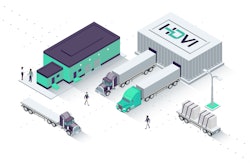
Platforms like Uber Freight, Convoy, Truckstop.com and DAT have digitized the way carriers find freight, and Brooklyn-based startup Koffie Labs is hoping to do the same for how fleets find truck insurance.
Koffie Labs bills itself as "a digital insurer purpose-built for the next generation of trucking and transportation," and "the first insurtech to integrate safety technology into underwriting, pricing and loss control," using telematics and advanced safety technology to underwrite trucking companies and reward fleets that invest in safety with discounted insurance premiums.
Offering fleets a discounted premium for the deployment of safety tech isn't anything new. The easiest way to get a quick – if not small – break on insurance rates is to incorporate telemetry data monitoring or a camera, but Koffie COO Mike Dorfman noted that underwriters currently, "don't actually do anything with that data on the pricing side," he said. "They say, 'We'll give you a 5% discount if you tell us you have a telematics system,'" but then underwriters do not figure out how much of difference they are making and using that data to reward fleets on an ongoing basis.
This is where Koffie steps in.
Koffie has partnered with technology providers to offer equipment that captures fleet-wide driving habits through road- and driver-facing cameras and telemetry data through the driver's ELD. Despite a heavy integration with Koffie Labs, the fleet owns the equipment and all the data it generates, and has the ability to monitor all the reporting data at all times.
Koffie also monitors the data to "conduct loss control reports [and] send risky driving behaviors to management in order to get driver coaching and mitigate risky driving behavior," Dorfman said. This puts Koffie Labs – an insurance provider, remember – in the role of de facto safety manager, which Dorfman said gives smaller carriers the kind of resources and technologies that large fleets have had for years. When a driver displays less-than-desirable on-road manners, Dorfman said his company would, using the data its has gathered, work with the carrier to improve their quality of driving. Drivers are assigned a score so the fleet manager would have a clear understanding of who are its best (or safest) drivers.
Rate adjustments are made annually. Credits are applied at the end of each policy year, Dorfman said, with any additional performance-based discounts and credits made upon policy renewal. Dorfman expects Koffie Labs' premiums to be "competitive" when it launches later this year, and about 25% cheaper than market averages for the safest operators.
The camera and ELD are the only required pieces but Dorfman said his company would also monitor routing, geography, vehicle speed, fuel efficiency, idle time and "anything where we can add value to help fleets make better decisions." Why would an insurer care about a fleet's idle time? It doesn't, necessarily. But Dorfman notes that the data is captured anyway, and by creating a benchmarking report that shows a truck's average versus a fleet average – or even an industry average – Koffie transitions itself from the role of provider to partner.
I suspect there's also an element of "if you take care of the little things, the big things take care of themselves." Drivers who are tuned in with fuel efficiency, idle time and speed tend to be better performing drivers overall.
Another benefit of taking the insurance process digital, Dorfman said, is that it enables the company to offer quotes instantaneously – a process that currently can take weeks, if not months. Real time data and machine learning models allow Koffie to offer a quote with only a fleet's DOT number and truck VIN.
If the last 11 months have taught us anything it's that practically the entire world can conduct business in a virtual environment, and it can be done fairly efficiently. And if digital freight brokers have proven anything to carriers it's that the same level of technological sophistication is adaptable to transportation.










